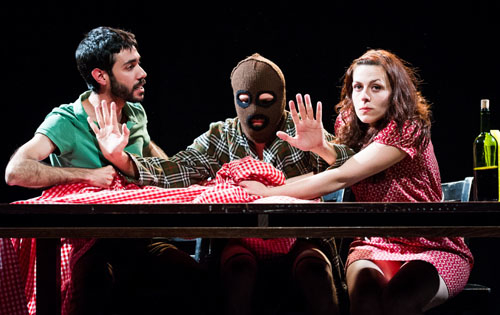Solfatara (Tour – Salford)

© (c) Alex Brenner
It is safe to say that you do not see a play like Solfatara every day. Atresbandes, the Catalan Theatre Company, perform entirely in Spanish and the surtitles do not just translate the dialogue they offer also a sardonic commentary on the action. Yet there is no sense of the company sacrificing substance for empty novelty.
Solfatara are defined as openings in volcanoes that emit hot sulphurous gases. The play, devised by the Company, uses this as a metaphor for the cracks that are beginning to form in the relationship between Monica (Monica Almirall) and Miquel (Miquel Segovia).
The play is simply staged with the couple trading inconsequential conversation around the dining table or addressing their guests. The difficulties that the couple have communicating are made clear by an unacknowledged third party in the room. Albert Perez, wearing a dressing gown and a balaclava, wanders around articulating the fears and resentments that the couple feel unable to discuss.
The play makes clear the ludicrous lengths we will go to so as to conceal our true desires and the embarrassment caused by rituals such as dinner parties. Despite the heavy subject matter Solfatara is a very funny play with lively and imaginative presentation. It is hard to get a laugh when not speaking the native language of the audience but the surtitles, rather than being distraction, add to the humour.
On occasion they do not provide a translation explaining instead that what the couple are discussing is simply too boring. The surtitles accidentally reveal the translator’s sexual fantasies about Almirall or slip into pop lyrics or public health warnings.
To an extent dialogue may not be necessary as the cast are skilled mimes capable of communicating the social embarrassment experienced by the couple through desperate fixed smiles and stiff formalised gestures. Albert Perez’s growing frustration is all too easy to understand and his rage provides a much needed release.
No, you certainly don’t see many plays like Solfatara – and more’s the pity.
(Reviewed at the Lowry)










